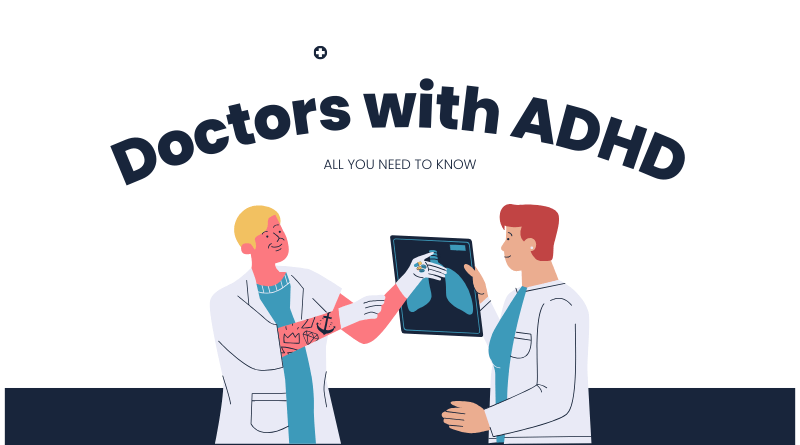Attention Deficit Hyperactivity Disorder (ADHD) is often portrayed as a childhood condition, leading to misconceptions about its impact on adults. However, millions of adults navigate life with ADHD, and a surprising number find success in demanding fields like medicine. This article explores the unique experiences of doctors with ADHD, highlighting the challenges and opportunities this combination presents.
Can Doctors Have ADHD?
Absolutely! Studies suggest that ADHD is more prevalent among medical students and doctors than the general population. There’s no reason why someone with ADHD can’t become a skilled and compassionate physician. In fact, some argue that ADHD can even translate into strengths for certain medical specialties.
Challenges Faced by Doctors with ADHD
The demanding nature of medicine can present specific challenges for doctors with ADHD. Here are some common hurdles:
- Maintaining Focus: Detailed record-keeping, long patient consultations, and complex diagnoses require sustained focus, which can be difficult for some with ADHD.
- Time Management: Doctors often juggle tight schedules with unexpected emergencies. Managing time effectively is crucial, but it can be a struggle for those with ADHD.
- Organization: Keeping track of medical records, prescriptions, and patient information requires meticulous organization. ADHD can make it difficult to maintain organized systems.
- Hyperactivity and Impulsivity: While hyperactivity might not be as prominent in adult ADHD, some doctors might experience restlessness or blurting out ideas during consultations.
However, these challenges don’t diminish the competence of doctors with ADHD.
Also Read Understanding ADHD: Diagnosis, Treatment, and Living
Strengths of Doctors with ADHD
Doctors with ADHD often possess unique strengths that benefit their patients and careers. Here are some:
- Creativity and Problem-Solving: The “outside-the-box” thinking often associated with ADHD can be an asset in medicine. Doctors can approach complex medical cases differently, leading to innovative solutions.
- Enthusiasm and Passion: Many doctors with ADHD report high levels of enthusiasm and passion for their work. This can translate into genuine care and dedication to their patients.
- Hyperfocus: While maintaining focus can be challenging, individuals with ADHD can experience intense hyperfocus on tasks they find engaging. This can be beneficial when delving into research or tackling intricate medical cases.
- Resilience: Navigating life with ADHD often requires resilience and perseverance. These qualities can be valuable assets for doctors facing the pressures and challenges of the medical field.
1. A Different Lens: Creative Problem-Solving
The “outside-the-box” thinking often associated with ADHD allows doctors to approach medical challenges from a different perspective. They may be more likely to consider alternative diagnoses, explore unconventional treatment options, and find creative solutions to complex medical problems. This can lead to improved patient outcomes and a more holistic approach to healthcare.
2. Unwavering Enthusiasm and Dedication:
Many doctors with ADHD possess a strong drive and a passion for their field. This translates into a high level of patient engagement and a genuine interest in their well-being. Patients often appreciate the doctor’s enthusiasm and dedication, which can foster a positive and trusting physician-patient relationship.
3. The Power of Hyperfocus:
While hyperfocus can sometimes be a source of distraction, it can also be a powerful asset. When channeled effectively, this intense focus allows doctors with ADHD to delve deeply into a patient’s case, meticulously analyze medical records, and research all available treatment options. This dedication ensures that patients receive comprehensive care, with no detail overlooked.
4. Empathy and a Unique Perspective:
Having firsthand experience with a neurodevelopmental condition can cultivate a deep sense of empathy and understanding towards patients facing various challenges. Doctors with ADHD may be more attuned to the emotional needs of their patients and better able to communicate in a way that resonates with them. This can lead to a more positive patient experience and improved adherence to treatment plans.
5. Resilience and Overcoming Challenges:
Navigating life with ADHD often requires a strong sense of resilience and perseverance. These skills translate well to the demanding and ever-changing landscape of medicine. Doctors with ADHD often develop effective coping mechanisms that enable them to adapt to pressure and manage challenging situations effectively.
Optimizing Strengths: Creating a Supportive Environment
While ADHD offers unique strengths, it also presents challenges. Here’s how medical institutions can create a supportive environment to help doctors with ADHD thrive:
- Open communication: Fostering an environment where doctors feel comfortable disclosing their ADHD allows for tailored support and reduces stigma.
- Flexible work arrangements: Some doctors with ADHD may benefit from flexible scheduling or alternative work models to optimize focus and manage time effectively.
- Access to technology and resources: Utilizing technology like scheduling software, dictation tools, and digital note-taking apps can streamline workflow and enhance organization.
- Mentorship and support systems: Providing mentorship from experienced doctors who understand ADHD can offer valuable guidance and support.
Strategies for Success
Doctors with ADHD can utilize various strategies to thrive in their careers. Here are some tips:
- Develop strong organizational systems: Implement digital tools, planners, and routines to manage schedules, appointments, and patient information.
- Utilize technology: Take advantage of apps and software to enhance focus, time management, and organization.
- Seek support: Surround yourself with colleagues and mentors who understand ADHD and can provide encouragement and guidance.
- Advocate for yourself: If necessary, work with your practice to implement reasonable accommodations that support your work style.
- Celebrate your strengths: Recognize and leverage the unique advantages that ADHD brings to your practice.
The Future of Doctors with ADHD
As awareness and understanding of ADHD grow, the medical field is likely to see more doctors with the condition openly discussing their experiences. This can have a positive impact on both patient care and reducing stigma around ADHD.
By harnessing their unique strengths and implementing effective management strategies, doctors with ADHD can continue to contribute significantly to the medical field and provide exceptional care to their patients.
Conclusion
ADHD in doctors is a topic rarely discussed. However, doctors with ADHD can be valuable assets to the medical field. By acknowledging the challenges and harnessing their unique strengths, these doctors can achieve remarkable success and provide exceptional care to their patients.

